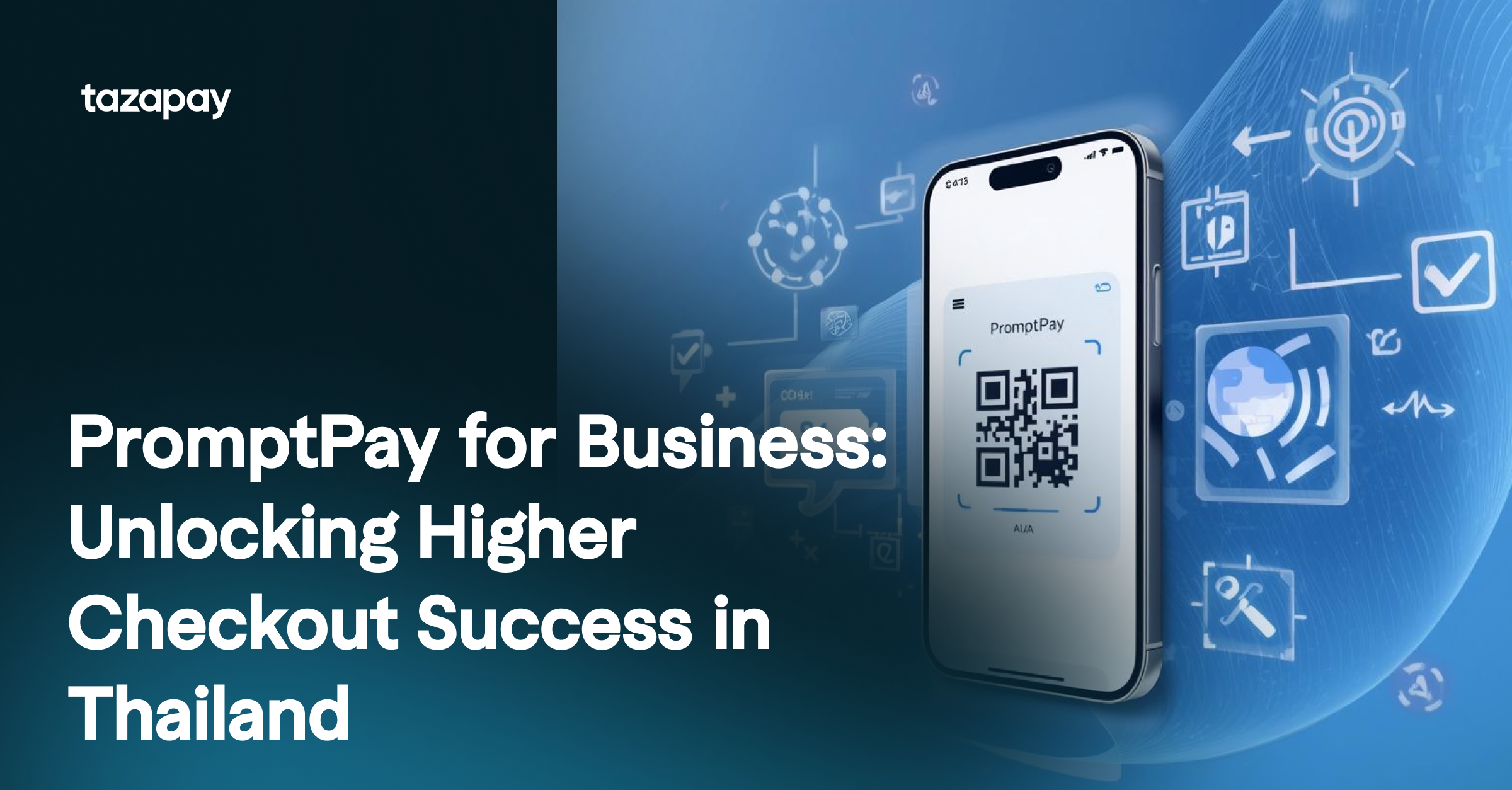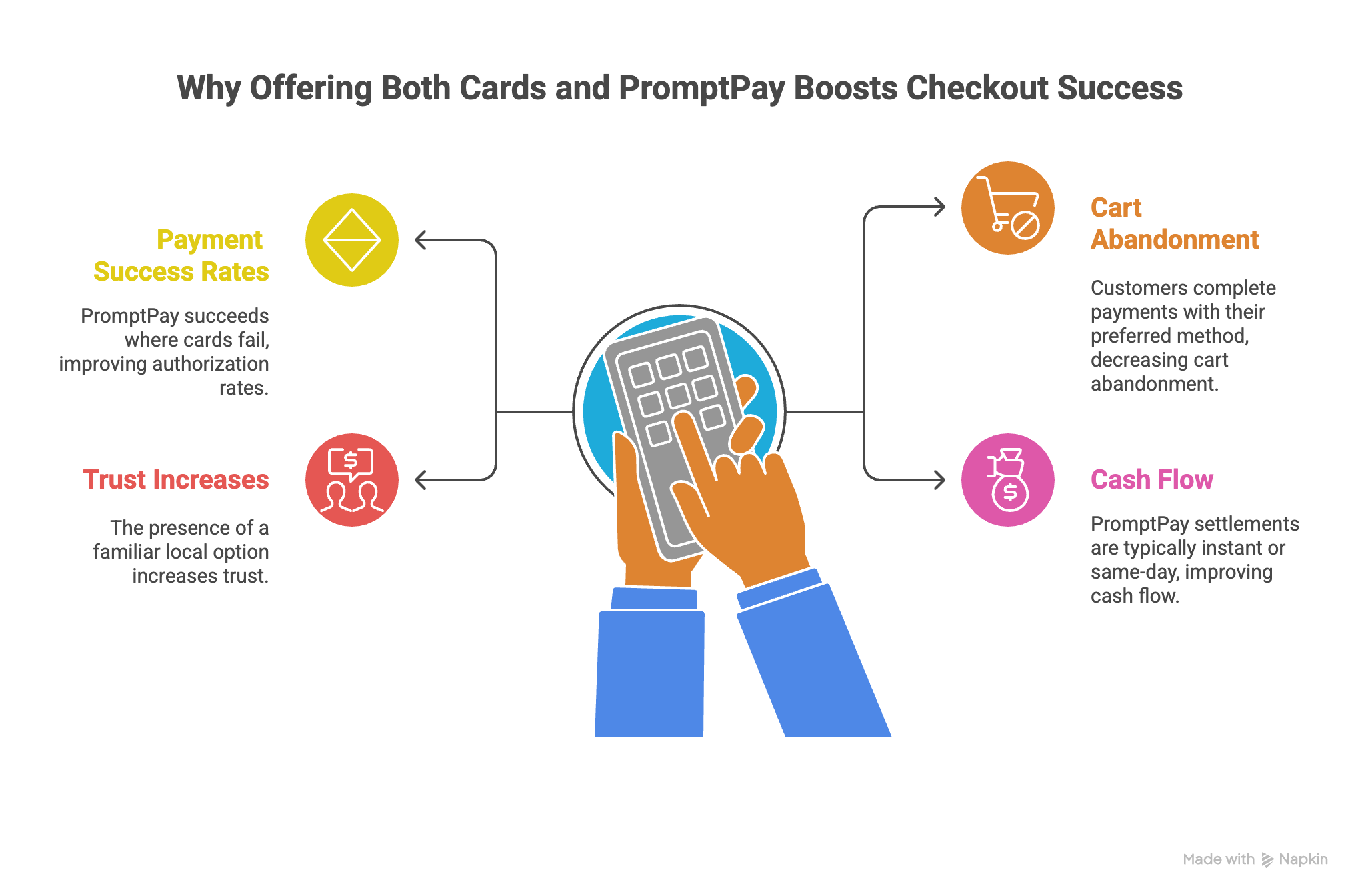Thailand is embracing the dawn of digital payments after being cash-dependent for decades. In the last six years, the nation has made significant strides in rolling out financial technology, increasing the penetration of such services among its populace¹. According to 2022 statistics, approximately 77.8% of Thailand's population of 70.01 million are active internet users, showcasing a high degree of digital literacy².
A key driver in Thailand's digital transformation has been PromptPay, an interbank real-time payment system, developed as part of the National e-Payment Master Plan¹. PromptPay is not only a popular local payment method but is increasingly integrated into international payment gateways, facilitating cross-border transactions.
What Is PromptPay?
PromptPay is a cornerstone of Thailand's payment systems, operating as an interbank real-time, near-instant payment gateway that simplifies the way users receive and transfer funds. It links payments to a Citizen ID or mobile phone number, and is similar in functionality to India’s UPI and Singapore’s PayNow3.
Developed in cooperation with major Thai banks and Vocalink, a Mastercard company, PromptPay is instrumental in supporting the Thai government’s initiative to transition from a cash-reliant economy to a robust digital economy4.
User Trends in PromptPay
Thailand led all countries in real-time payment transactions per capita in 2022, with the payment method accounting for 34% of all transactions5. The significant uptake of PromptPay is attributed to the widespread availability of mobile phones, which have been a major driver of digital adoption and PromptPay transactions. Since its implementation in 2017 to 2023, PromptPay transactions have surged annually from 88.07 million to over 19.9 billion, underscoring its central role in Thailand's digital economy and cross-border transactions6.
Despite these encouraging numbers, the real sentiment towards digital payments in Thailand remains complex. During the pandemic, digital payment methods saw a surge in use, but in 2022, a survey by the Bank of Thailand indicates a revert to cash for many7. Citing convenience and the absence of added fees, over 50% of respondents across all age groups expressed a preference for cash, with only 27% of the surveyed continuing with digital payment apps post-pandemic8.
Benefits and Drawbacks of Using PromptPay for Online Payment Gateways
As read in the previous section, Promptpay might not be the ultimate solution for digital payments. Nonetheless, it continues to grow in popularity as a local payment method in Thailand and as part of international payment gateways. Why is this so? We now explore its key advantages and limitations:

Benefits
- Smooth Checkout Experience: As an interbank payment system, PromptPay allows users to make purchases seamlessly across all banks in Thailand, enhancing the user experience in digital transactions.
- Real-Time Payment: Transactions are processed instantaneously, usually completing in under a minute, which is ideal for both local and international transactions.
- Secure and Simple: With a mobile phone and internet connection, PromptPay offers a convenient and secure way to transact, linking each account uniquely to a Citizen ID to bolster security.
Drawbacks
- Low Merchant Adoption in Thailand: The preference for cash among local vendors means digital payment options like PromptPay are less common in grassroots markets. This presents an opportunity for international online businesses to differentiate themselves to a digitally literate audience in Thailand.
- Fixed Price During Checkout: The fixed pricing structure of digital payments contrasts with the traditional bargaining culture in Thai markets. However, innovations in social commerce platforms like LINE are adapting by integrating haggling features into digital payments, offering flexible pricing through payment links9.
How PromptPay Works in an International Payment Gateway
PromptPay is primarily a local payment system in Thailand, but the Thai government is expanding its reach internationally, with agreements already in place with Malaysia and Singapore. For cross-border transactions, PromptPay requires the use of a third-party payment provider, which serves as the international payment gateway.

Transaction Process:
1. Users first transfer funds to the payment provider's Thai bank account via PromptPay. This can be done by either scanning a QR code or entering the recipient's Citizen ID or phone number within the PromptPay app.
2. After the transaction, the PromptPay app confirms the successful transfer of funds with a notification.
3. The funds are then transferred to one of the payment provider’s international accounts. Finally, these funds are disbursed to the foreign seller's bank account.
When selecting a third-party payment provider for international transactions involving PromptPay, it’s crucial to choose one that offers a robust network of localised markets. This ensures that the service aligns with the specific needs and regulations of the target markets, enhancing the efficiency of cross-border payments.
What are the Fees Required in Using PromptPay?
Local Transactions:
As of 2024, PromptPay’s fee structure of local transactions within Thailand are as follows:
- Transactions not exceeding 5,000 baht: Free
- Transactions from 5,000 to 30,000 baht: 2 baht fee
- Transactions from 30,000 to 100,000 baht: 5 baht fee
- Transactions from 100,000 to the bank maximum limit: 10 baht fee
This fee model makes PromptPay an attractive option for everyday payments and small business transactions within the country.
International Transactions:
When it comes to cross-border payments facilitated through a third-party payment provider, standard charges apply. These include FX costs, platform fees, and setup fees, which vary depending on the provider chosen. For more information, read our blog article on The Actual Costs in Using a Payment Gateway.
Selecting a reputable and secure international payment gateway is thus crucial to manage these costs effectively and ensure transaction security.
How can Tazapay help?
Understanding the nuances of PromptPay and its fee structure arms you with the knowledge to more effectively penetrate the Thai market. If you're exploring further solutions to enhance your business operations, consider Tazapay. Offering specialised payment solutions for a wide range of needs—from eCommerce platforms to exporters and importers—Tazapay tailors services to help your business thrive in international markets.
Contact us to find out more
Sources
- The Dawn of Thailand’s e-Payment Era - Thailand NOW
- Digital 2022: Thailand — DataReportal – Global Digital Insights
- Bangkok Bank PromptPay
- Transforming Thailand to a digital economy | Mastercard
- Thailand Ranked First Globally in Real-Time Payments Transactions per Capita
- Thailand Volume of PromptPay Transactions from 2017 to 2023
- Thailand Rejects Digital Payments in Favour of Cash (cashmatters.org)
- Cash still king, people reject app payments - Thai Examiner
- Social commerce in Thailand - statistics & facts | Statista
FX losses occur when funds are converted prematurely or at unfavorable rates, reducing your overall revenue. These small gaps compound significantly across multiple transactions.
Virtual accounts let you collect and hold funds in the same currency without immediate conversion. You can convert or pay out later when rates are more favorable.
No. Tazapay allows businesses to open named virtual accounts in 35+ currencies without the need for local entity registration.
Tazapay supports collections in 35+ currencies and payouts in 100+ currencies through local bank rails or SWIFT.
Yes. You can initiate global payouts directly from your virtual account balances — all managed in one unified dashboard.
Tazapay operates under licenses and registrations with MAS (Singapore), FINTRAC (Canada), AUSTRAC (Australia), and VASP (Lithuania).







.png)





